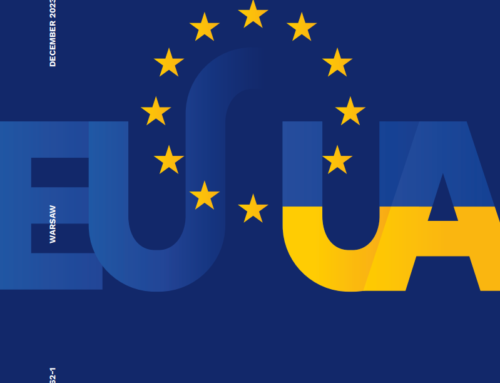The sanctions will lead to a double-digit drop in Russia’s GDP in 2022
Opublikowano: 04/03/2022
The Western sanctions will lead to a drop of around 15-20% in Russia’s GDP in 2022, the Polish Economic Institute’s economists forecast. As a result, Russia will not only be poorer than all the EU countries, but also poorer than certain countries in South America, such as Uruguay. Even before it invaded Ukraine, Russia had not been a rich country in relative terms: its GDP was just 51% of Germany’s, between Chile and Greece. Moscow stood out from the rest of the country – and will continue to do so. Earlier, its wealth was comparable to that of the Czech Republic; after the sanctions, it will be at the level of Latvia.
“The sanctions imposed by the West so far will have a snowball effect on the Russian economy. The total collapse of the rouble exchange rate will limit profitable imports, products shortages will inhibit production, inflation will surge, and Russia will only be able to defend itself using the tools of domestic economic policy, such as by printing more roubles. Panicked cash withdrawals have already led to a collapse in the banking sector’s liquidity. Hyperinflation will wind up this spiral again, the rouble will continue to weaken and the economy will face many years of recession,” said Piotr Arak, director of the Polish Economic Institute.
The sanctions imposed by the West will lead to the collapse of the entire Russian financial system and slow down economic activity in Russia’s largest agglomerations; as a result, they will affect the entire country. The sanctions will hit the two largest economic regions the hardest: Moscow, which accounts for 38.5% of the country’s exports, and St. Petersburg, which generates 6.4%. The country’s other regions account for less than 4% of Russian exports.
“With the impact on major agglomerations, the key sectors of the Russian economy will collapse: industry, retail and the real estate market. The ban on the transport of modern technologies and the suspension of the import of Russian products will directly affect the industries that make up the largest part of GDP: manufacturing (which accounts for 14.8% of GDP) and mining (9.8%). The financial crisis and economic downturn will mean a recession in retail (13.1%) and the real estate market (10.5%). This will also result from foreign companies’ withdrawal from Russia,” said Jakub Rybacki, deputy head of the macroeconomics team at the Polish Economic Institute.

The crisis will also escalate to industries not directly covered by the sanctions, such as the production of metals, food, wood and plastic. This will result from the shortage of machinery. Due to the low quality of domestic products, most of the demand for machinery in Russian industry is met by imports, mainly from EU countries. Russian industry repairs and maintains them. Sanctions on the export of technology and machines, and above all difficulties in cooperating with Western companies, will result in partial production downtime and block the development of industry.
***
The Polish Economic Institute’s analysis is based on the comparable experience of Iran in 2012, when it was subject to a similar package of sanctions. These included a ban on purchasing oil and chemicals from the country, the freezing of Iranian assets, and exclusion from SWIFT. The restrictions immediately reduced Iran’s GDP by almost 10%. The Congressional Research Service estimates that the total damage to Iran’s GDP amounted to 20%. Other analyses indicate that the sanctions reduced the potential rate of economic growth by around 1-2 percentage points, and that the social pressure exerted by the sanctions lasted for around 6 years. In the case of Russia, the initial impact of sanctions could be as much as twice as strong as in Iran, due to its more established economic ties with the West.
***
The Polish Economic Institute is a public economic think tank dating back to 1928. Its research primarily spans macroeconomics, energy and climate, foreign trade, economic foresight, the digital economy and behavioural economics. The Institute provides reports, analyses and recommendations for key areas of the economy and social life in Poland, taking into account the international situation.
Media contact:
Ewa Balicka-Sawiak
Press Spokesperson
T: 48 727 427 918
E: ewa.balicka@pie.net.pl
Kategoria: Analysis / Press releases / Russia's invasion of Ukraine





